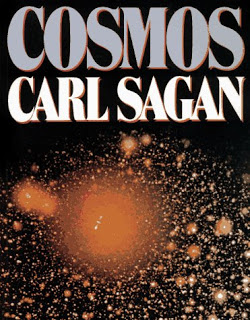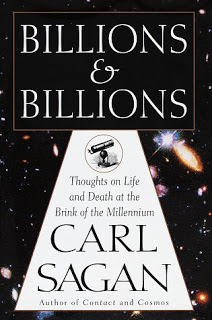While religion’s a hot topic for just about everyone, it hasn’t cast what others would see as a large shadow on my own life. However, that’s not quite the full story. In fact, I do feel that I have a religion and have come to call myself a Saganist. Of course I’ve also found that explaining this to others comes with several hurdles including the obvious one of people being certain I just told them that I’m a “Satanist” which would be something entirely different.
Thankfully I’m not a Satanist, so then what is a Saganist? Well, first you need to know that I don’t have any sort of pre-determined dislike for organized religions. That said, I have grown cynical of quite a few of them based on my own experiences, world history, and the nightly news reports of their various actions. For me it’s really been a case of not finding the right fit. God has always had a role to play in my life, even if I couldn’t really put a “face” to what God means to me, or what shape such a power takes on.
 In my youth there was a park up the road and I would spend hours laying at the base of a tree looking up through its leaves, into the sky, and think about the universe and how it all must work. Over time I got to the point where I could just look up and realize there was a God. I could look into a child’s face and see God. I could look at a stream and see God. I could see God in a thunderstorm. I could smell God on a snowy mountain. Where I couldn’t see God was in a house fire, or a car wreck, or more importantly, in a prayer.
In my youth there was a park up the road and I would spend hours laying at the base of a tree looking up through its leaves, into the sky, and think about the universe and how it all must work. Over time I got to the point where I could just look up and realize there was a God. I could look into a child’s face and see God. I could look at a stream and see God. I could see God in a thunderstorm. I could smell God on a snowy mountain. Where I couldn’t see God was in a house fire, or a car wreck, or more importantly, in a prayer.
This left me with quite a problem. When I would research various religions each one would ultimately fall short in my mind. Most often it would be drenched in dogma and require leaps of faith that I simply was not prepared to make. What’s more is that each of these religions demanded that I see God in everything — good and bad. The latter struck me as a bit of a cop-out to be quite honest. The phrase, “God works in mysterious ways” has never seemed genuine to me. It simply seemed a way for people to defuse blame where either blame could not clearly be placed, or where it didn’t want to be.
So that left me in a continual state of flux. I couldn’t find something that fit, and those who had claimed to find it would often try to hit me with the faith argument. Then I came upon the works of Carl Sagan.
 For those too young to remember, Carl Sagan was a noted astronomer. In his days astronomers were pretty quiet people. They did research and pretty much avoided the spotlight. Sagan was quite different. He had a unique passion for astronomy, and wanted to share his love with the rest of the world, and set out to do just that. What really set Sagan apart was that even though his dialogue could betray a clearly brilliant and complex mind, he was able to articulate his wonder of the universe to any layman he encountered. He would show up on the old Tonight Show and mesmerize audiences with his discussion of the stars, and the worlds beyond our own. He also could plant a seed of curiosity in others, and get them to think about the universe in new ways, or, at the least, for the first time.
For those too young to remember, Carl Sagan was a noted astronomer. In his days astronomers were pretty quiet people. They did research and pretty much avoided the spotlight. Sagan was quite different. He had a unique passion for astronomy, and wanted to share his love with the rest of the world, and set out to do just that. What really set Sagan apart was that even though his dialogue could betray a clearly brilliant and complex mind, he was able to articulate his wonder of the universe to any layman he encountered. He would show up on the old Tonight Show and mesmerize audiences with his discussion of the stars, and the worlds beyond our own. He also could plant a seed of curiosity in others, and get them to think about the universe in new ways, or, at the least, for the first time.
 Then came his most noted achievement — Cosmos. Cosmos was a TV series that appeared on PBS stations and simply exploded in popularity. That’s quite an achievement for any show let alone one that appears on PBS. I, of course, was an ardent fan of the show.
Then came his most noted achievement — Cosmos. Cosmos was a TV series that appeared on PBS stations and simply exploded in popularity. That’s quite an achievement for any show let alone one that appears on PBS. I, of course, was an ardent fan of the show.
Then came more shows and books from Sagan, and along the way he touched on a subject that is quite taboo to scientists — religion. Scientists are often among the first to eschew religion, and yet, Sagan would make the case that science and religion are not enemies and need not be mutually exclusive.
He finally won me over in one of his books when he went on at great length to explain his own theories on religion. He pointed out that, in his view, it seemed quite hard to discount a higher power when it came to the universe we live in — that it couldn’t all have just popped into existence with such incredible balance and complexity. He once said, “The idea that God is an oversized white male with a flowing beard, who sits in the sky and tallies the fall of every sparrow is ludicrous. But if by ‘God,’ one means the set of physical laws that govern the universe, then clearly there is such a God.” This would open the door, and then he’d qualify it with statements like, “This God is emotionally unsatisfying… it does not make much sense to pray to the law of gravity.”
 However, he also went much further by explaining that, to him, there always seemed to be a higher power at play in the universe. Where he would draw the line is in our role in the whole experience. He felt that ours represented just a tiny fraction of the whole. He believed that it is simply ridiculous to suggest that our meager capabilities could allow us to comprehend, even remotely, the plans behind such a force. In fact, he would say that anyone claiming to have the ultimate answer and path toward enlightenment was doing so out of nothing more than arrogance. In this belief I became a convert.
However, he also went much further by explaining that, to him, there always seemed to be a higher power at play in the universe. Where he would draw the line is in our role in the whole experience. He felt that ours represented just a tiny fraction of the whole. He believed that it is simply ridiculous to suggest that our meager capabilities could allow us to comprehend, even remotely, the plans behind such a force. In fact, he would say that anyone claiming to have the ultimate answer and path toward enlightenment was doing so out of nothing more than arrogance. In this belief I became a convert.
It has always struck me that people want to be seen as having a central role in the workings of the universe. It is, in my view, a weakness of humanity that we must cast ourselves in the leading roles of this monumental story. To me it seems quite clear, that whatever shape God inhabits, that it’s beyond our comprehension to even begin to contemplate the variables involved. It’s not only beyond our capabilities to conceive of them, but also best to simply state that we have no idea, admit it to one another, and just move on in our mutual wonder of the whole puzzle that is life.
It’s for this, and other writings and acceptances on my part, that I began to think of myself as a Saganist. I found it interesting that, at a family outing one day with my father, I mentioned this perspective only to find that he too had come to the same conclusion for himself. He said that he’d come to think of Sagan as his own personal Pope. Sadly, to this day, we seem to be the only two stated converts to this unofficial “religion”. Frankly, that’s fine. It works for me, and until such time as I find a better path, Saganism is one road I can follow willingly. It doesn’t demand that I attend a service, donate to a cause, sing, dance, genuflect or anything of the sort. It doesn’t require a major leap of faith. The only calling it makes to me is to recognize that I’m experiencing it — that I am lucky to have even the smallest of roles at the very end of the longest list of credits conceivable. And in that I find contentment.

6 Comments
But what do we do with it? See, in my mind that’s the important question of religion. It doesn’t really matter whether God exists, what form he/she/it takes, or what he/she/it says. What matters (in my mind) is what we do while we’re stuck on this rock.
In a slightly similar vein, have you ever read Grendel? I highly recommend that you do (one of the things it addresses is this exact issue).
For me, that’s an entirely unrelated question. In fact, that’s part of what I haven’t liked about other religions. They shouldn’t be telling me how to live. How we carry ourselves should be something we determine amongst us and not try to back it up with some sort of fire and brimstone fantasy.
I agree with you that it matters what we do while we’re here but see it as a totally different discussion.
Saganism, if it says anything on the subject, says pretty much that. We’re not privy to the plan so we’re to figure it all out for ourselves just as we have on virtually every other count.
I know this is an old post, but I just found it. There are other Saganists out there!! I personally don’t want to even limit what I believe to one path, but the works of Carl Sagan speak to me deeply and I’d feel honored to call myself a Saganist as his approach to everything was inclusive, but skeptical. This is also my approach.
That being said, there are many things to do while we’re here and it’s pretty easy to find. In Christianity it is said that faith without acts is worthless.
I prescribe to this, but I think that the word faith is a tricky one. Christianity and most major religions deal with blind faith and I prefer to deal in wise faith. It’s the faith that, even though gravity is a theory, the next time I drop something it’s going to fall. Faith, untested, is not faith just like theories, untested, are hypotheses.
Terminology aside, we should be doing something to bring people together, break down walls of ignorance or prejudice, come together for the common human good, planetary and universal good.
If this seems to lofty that’s because it is. What I’ve listed are the outcomes of the efforts of individuals, many individuals, who work on a small scale. As an individual we do what we can. I prefer to live without harming other life, treat my fellow humans with kindness and compassion, do good where I can but accept that I can’t do everything, realize that I’m never alone, admit that help is needed to effect real change, and most of all, ask for that help.
“The only calling it makes to me is to recognize that I’m experiencing it–that I am lucky to have even the smallest of roles at the very end of the longest list of credits conceivable. And in that I find contentment.”
What a wonderful way to put it. Sign me on for Saganism, too.
As a recent convert to Saganism, I thank you for this post. Carl Sagan has opened my eyes to many things I thought were impossible or ludicrous. I’m just glad being a Saganist doesn’t entail spending my Saturday going door-to-door, trying to spread the word, only to have ‘billions upon billions’ of doors slammed in my face.
For those not familiar with Sagan the relation to the phrase, “billions and billions” will be a bit lost. I’m glad you mentioned it.
This quote was tied to him for much of his later life and the curious thing about it is that he never actually said it. It mainly grew out of jokes and impressions done regarding him–mainly by Johnny Carson.
Sagan would often use the world “billions” to describe the number of stars in the universe or the number of just about anything large. It stuck out so much that turning it into “billions and billions” was a pretty easy leap.
The other reason it was so tied to him is that his speech pattern was such that he had a very unique way of saying the word–emphasizing it in a way very different than what we normally here. He’d hit the “b” like a sledge-hammer hitting a metal post and the first syllable sounded more like “beal” than “bill”. Thus it’s no surprise that he’d carry this “quote” as part of his bio.